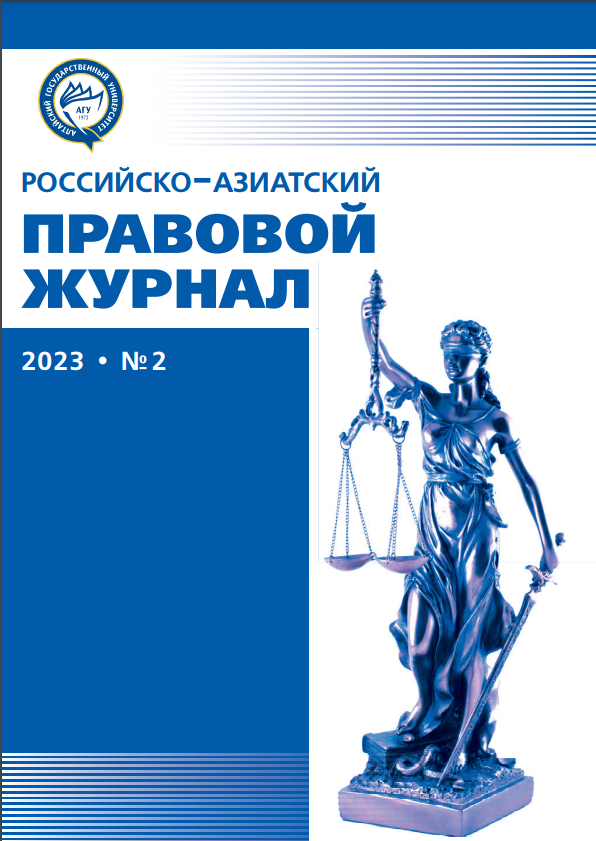ИНСТИТУТ ГРАЖДАНСКОЙ ДЕЕСПОСОБНОСТИ НЕСОВЕРШЕННОЛЕТНИХ И ПРАКТИКА ЕГО ПРИМЕНЕНИЯ
УДК 347.155 ББК 67.404
Abstract
The Institute of Civil Capacity of Minors is a long-standing subject of scientific knowledge. Eachnew stage of social development affects the definition by national legislation of the legal status of minorparticipants in civil turnover, expressed in the general norms of the Civil Code on individuals. The institution of the legal capacity of minors at the present stage of development has undergone, although not significant,transformations. A certain stage of the economic, social and legal development of modern society contributedto the legislative consolidation of the institute of emancipation, the right to engage in entrepreneurial activity,the right of minors to be members of cooperatives, previously unknown to the Russian legal order. Rapidevolution obliges to improve the legal infrastructure designed to provide adequate legal opportunities forminors to the dictates of time.
Downloads
References
Пешина И.Ю., Юрина М.А. Вопросы гражданско-правовой ответственности несовершеннолетних // Государство и общество: вчера, сегодня и завтра. 2012. Вып. 9 (10). С. 139–149.
Михайлова И.А. Согласование сделок несовершеннолетних лиц: практические и теоретические проблемы // Законы России: опыт, анализ, практика. 2015. №1. URL: https://wiselawyer.ru.
Сухарева Е.Р. Гражданско-правовая дееспособность и деликтоспособность малолетних и несовершеннолетних // Вестник Воронежского института МВД. 2016. №1. С. 178–185.
Летова Н.В. Статус ребенка: проблемы теории и практики // Вестник Томского государственного университета. 2019. №31. С 173–179.
Кочегарова Д.Ф., Бердников А.А. Дееспособность несовершеннолетних с ограниченными возможностями // Адвокат. 2015. №3. С. 56–58. СПС «КонсультантПлюс».
Чернякова С.А. Недействительность сделок по незаконному субъектному составу и ее последствия по российскому гражданскому праву : автореф. дис. … канд. юрид. наук. М., 2006. 25 с.
Во столько средние доходы богатых превышают средние доходы бедных / Н. И. Куликов, Е.С. Вдовина. URL: http://www.vrn.kp.ru.
Рабинович Н.В. Недействительность сделок и ее последствия. Л., 1960. 171 с.
Хейфец Ф.С. Недействительность сделок по российскому гражданскому праву. М., 1999. 162 с.
Пестерева Ю.С., Рагозина Е.И., Чекмезова Е.И. Роль Пленума Верховного Суда Российской Федерации в формировании судебной практики // Правоприменение. 2021. Т. 5, №4. С. 209–221.
Кузнецова Л.Г. Гражданско-правовое положение несовершеннолетних. М., 1968. 136 с.
Степанюк А.В. Проблема членства несовершеннолетних в возрасте от шестнадцати до восемнадцати лет в кооперативах (на примере членства в кредитных потребительских кооперативах) // Семейное и жилищное право. 2011. №1. С. 20–22.
Казиханова С.С., Галахтин М.Г. Предпринимательская деятельность несовершеннолетних // Актуальные проблемы российского права. 2016. №9 (70). С. 81–92.
Russian-Asian Law Journal is a golden publisher, as we allow self-archiving, but most importantly we are fully transparent about your rights.
Authors may present and discuss their findings ahead of publication: at scientific conferences, on preprint servers, in public databases, and in blogs, wikis, tweets, and other informal communication channels.
Russian-Asian Law Journal allows authors to deposit manuscripts (currently under review or those for intended submission) in non-commercial, pre-print servers such as ArXiv.
Authors who publish with this journal agree to the following terms:
- Authors retain copyright and grant the journal right of first publication with the work simultaneously licensed under a Creative Commons Attribution License that allows others to share the work with an acknowledgement of the work's authorship and initial publication in this journal.
- Authors are able to enter into separate, additional contractual arrangements for the non-exclusive distribution of the journal's published version of the work (e.g., post it to an institutional repository or publish it in a book), with an acknowledgement of its initial publication in this journal.
- Authors are permitted and encouraged to post their work online (e.g., in institutional repositories or on their website) prior to and during the submission process, as it can lead to productive exchanges, as well as earlier and greater citation of published work (See The Effect of Open Access).








